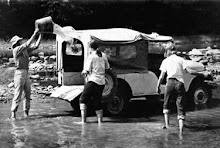Like so many other times here, I pushed myself out of my very narrow comfort zone to get something done. With no strong background in education or nutrition, I’ve helped to compile a resource book for an after-school fitness club and designed a healthy-eating handout for a health fair. Even though I’ve never painted before in my life, my last few Thursdays have been spent repainting the Habitat for Humanity ReStore. And while I am a million times more content to stand silently aside while others do the talking, I have been going alone on my own aid and companionship visits to hospice and home health patients.
These all may sound like minuscule feats, but they echo the sentiments conveyed in my favorite rural doctoring blog and in my conversations with local practitioners. While I step out of my normal comfort zone by driving up a steep driveway to clean house for and visit with a 95-year old woman, rural health care providers are stepping out of their comfort zones to treat hyperkalemia without nearby dialysis or to provide prenatal care to women when their expertise lies elsewhere.
This “rural self-sufficiency” is what attracts me to Wendover and to the rural health care field. If I had decided that the driveway were too rocky and steep or a nurse practitioner decides she doesn’t know enough about prenatal care, that leaves one old woman would wouldn’t have her house vacuumed and her porch swept and one young woman who wouldn’t get regular prenatal care. In medically under-served areas like Leslie County and my own hometown, you learn to expand your own boundaries, to traverse new frontiers because if you shy away from a task, there’s no one to step in and do it for you.
--jordan
P.S. Perhaps I’m not the first courier to feel this way:
" Couriers especially had to step out of their comfort zone to meet Breckinridge’s expectations. Working with the FNS, one former volunteer explained, forced them to leave their “sheltered existence” and “look…at life” in a new way. These young women arrived in “lovely riding boots and the most elegant jodhpurs” but soon found themselves rising at dawn, sleeping on cots and standing in line to brush their teeth. Tasks they would have never imagined performing, such as leading livestock over the mountains between nursing centers, became routine. "
from Mary Breckinridge: The Frontier Nursing Service & Rural Health in Appalachia
